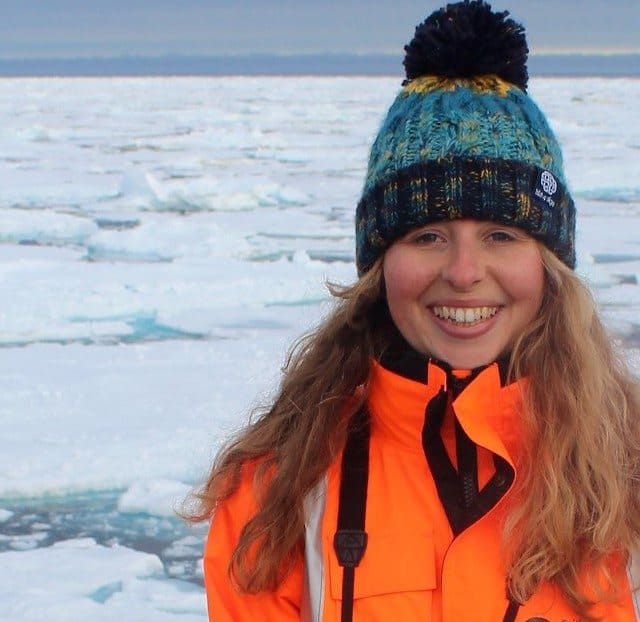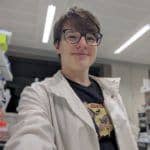-
Asked by anon-380443 on 1 Feb 2024. This question was also asked by anon-384050.0
Question: Whats the most interesting and exciting thing you have have ever discovered
- Keywords:
-
Martin McCoustra answered on 1 Feb 2024:
A few years ago, we discovered a new class of molecular solids in which the molecules arrange themselves to produce an electric field. One of the molecules that does this is carbon monoxide, the second more abundant molecule in space after molecular hydrogen. We realised that during the process of forming stars, dust grains get covered with carbon monoxide ice which has an electric field around it which draws in ions from the surrounding gas. This changes the charge balance of the gas cloud, collapses the magnetic field in the gas cloud that stops star formation, and triggers star formation. It’s cool that such an effect on a small scale can impact of such a hugely important process.
-
Bruno Silvester Lopes answered on 1 Feb 2024:
Loads of things but one to remember is two new species of bacteria. They are called Acinetobacter terrae and Acinetobacter terrestris. Please do google them and you will see my research paper. Other than that I have also discovered new viruses which can eat bacteria and can be used to fight those bag bugs 🙂
-
David Bremner answered on 2 Feb 2024:
I haven’t made any discoveries on my own but working in nutrition some of the faecal samples from studies i have been involved in running have led to identification of previously unknown bacteria in the gut microbiota.
-
Alexander De Bruin answered on 2 Feb 2024:
I once discovered a way to stick a powder onto the inside of a ceramic filter, an idea that was then fullydeveloped by some of the other JM scientists signed up to IAS! This might not sound like a lot, but it’s now used in car exhausts around the world to stop harmful soot particles reaching your lungs!
-
Andrew McDowall answered on 2 Feb 2024:
The most exciting thing I’ve discovered is what I didn’t discover. I was researching a type of material containing cubes of 4 metal atoms and 4 sulphur atoms of interest for magnetic storage devices. When cooled these cubes either stretched or compressed depending on the metal present. This was well known and understood. So we started to see what would happen if we mixed the metals. The results should have been very predictable, changing the metal chaged the number of electrons present to form bonds, changing the number of bonds changed whether the cube would stretch or shrink.
Except that they didn’t.
When we mixed the metals absolutely nothing happened. It didn’t matter how low we took the temperature the cubes remained fixedly cubic. The theories regarding the structure and drive were imperfect.
So my most exciting discovery was discovering that something wasn’t there to be discovered. the joy of science…. -
Rachel Edwards answered on 2 Feb 2024:
The most exciting one was my first time finding out what a Fermi-surface looked like for a new material. The Fermi-surface is something that metals have, and it tells us what the electrons in the metal can do – so lets us know if the new material is useful or not. I did measurements and worked out what it looked like, and for a whole weekend I was the only person in the world who knew.
-
Anitta Chacko answered on 3 Feb 2024:
I wouldn’t call it a discovery but when I imaged some brain cells I was growing in labs on a microscope, it was really cool to see them fire and light up!
-
Sharron Kenny answered on 5 Feb 2024:
i worked on surface XRF of bees once. 2 sets of samples one was a bee from the countryside another was from next to a chemicals plant. it was very interested to see that the elements on the surface hairs of the countryside bee where very clean some sulphur from flowers/plants. yet the one from the industrial area had clear iron and nickel visible on the legs and the body hairs. showing that enviromental contaminants had been picked up by the insect life/bee
-
Kirsty Lindsay answered on 6 Feb 2024:
I love finding anything that makes me “go… umm… that’s weird”, because it new and unexpected.
We are working on a new way to exercise after having a baby at the moment. If it works that wil;l be super-exciting!
-
Kirsty Ross answered on 8 Feb 2024:
That a sniffable vaccine I designed and made actually generated immunity in my mice. If I ever go back to bench science, I’d use that technology to make sniffable viral vaccines.
-
Michael Schubert answered on 22 Mar 2024:
I think one of the most exciting things I’ve ever discovered myself was a new way that our DNA packages itself up inside our cells. It taught us things we didn’t know before about how our genes are read or hidden, which affects how we grow and develop, whether we get cancer or not, and maybe even how we can “turn off” cancer in the future so it can’t grow and make people ill.
(I have to say, though, one of the coolest things I’ve ever been a part of discovering was a new species of dinosaur. My colleagues and I were on a fossil dig, found some big bones we weren’t expecting to see, and they turned out to be a whole new kind of dinosaur!)
Latest Questions
-
How do you make new drugs
-
how many plants do you study normally?
-
what happens when a person whos sick gets a DNA while the person is sick what do you do
-
What are polysaccharides?
-
how many nuclear explosions happen in the world
-
how does your job effect your daily life ? (2 Comments)
-
why does nuclear waste glow in the dark? (1 Comment)
-
how to you deal with problems you come across when doing your research? (2 Comments)
-
If you have been emotionally invested (focusing on anxiety if you suffer with it, dementia etc) do you find it
-
what motivates you to carry out your research? (1 Comment)
Latest Comments
-
how does your job effect your daily life ? (2 comments)
-
why does nuclear waste glow in the dark? (1 comment)
-
what motivates you to carry out your research? (1 comment)
-
how to you deal with problems you come across when doing your research? (2 comments)
-
How long have you been a scientist for (2 comments)







Comments